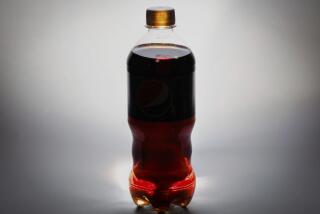FDA Approves New Artificial Sweetener, First in Decade to Escape Warning Label
- Share via
WASHINGTON — The Food and Drug Administration on Wednesday approved a new calorie-free artificial sweetener and for the first time in a decade will allow a sugar-substitute to be sold without a health warning label.
The approval came over the objection of a Washington consumer interest group that had charged that the new sweetener, acesulfame potassium, may have been responsible for tumors that developed in laboratory rats. The group urged that more tests be conducted.
The FDA and the chemical’s manufacturer, Hoechst Celanese Corp., of Somerville, N.J., dismissed the health concerns as groundless and said the sweetener, which will be marketed under the brand name Sunette, is entirely safe in amounts humans would consume.
‘Safe, Sweet, Stable’
“It’s safe, sweet and stable,” said Hoechst Communications Director Donna Kaufman. She said the substance is different from two other FDA-approved artificial sweeteners, aspartame, which is sold under the brand name Nutrasweet, and saccharin because it poses no health risk and does not break down under high temperatures.
FDA approval permits use of the new product as a sugar-substitute in packets and tablets, and as an ingredient in chewing gum, dry mixes for beverages, instant coffee and tea, gelatins, puddings and non-dairy creamers.
The FDA is still considering use of acesulfame potassium as an ingredient in candy, and Hoechst is preparing applications for permission to use it in soft drinks and baked goods, Kaufman said.
Impact Called Limited
Industry analyst Jane Belcher of Duff & Phelps in Chicago, said the FDA’s limited approval will sharply limit Sunette’s initial impact on the nation’s billion-dollar artificial sweetener market. The dried products in which it can be used make up about 30% of all sales, compared to 70% for carbonated soft drinks.
But, she said, Sunette’s real market advantage will be in candies and baked goods if and when the FDA approves its use. There it will have the field to itself by virtue of its unique stability at high temperatures. Other artificial sweeteners lose their sugar-like quality when cooked.
An organization that monitors low-calorie food marketing said it expects the addition of a third artificial sweetener, described as much sweeter than sucrose, to increase the entire national consumption of artificial sweeteners.
“What we expect to see is an expansion of the overall market,” said Russell Lemieux, a spokesman for the Calorie Control Council. He said that about 78 million Americans already use artificial sweeteners.
Used in 20 Countries
The World Health Organization endorsed the new substance in 1982, and it is in use in 20 countries. No related health problems have been detected in those countries, said FDA Consumer Safety Officer Patricia McLaughlin.
But the Center for Science in the Public Interest said in a letter sent last September cited lung and mammary tumors found in laboratory animals fed the chemical in large quantities during testing.
In an interview Wednesday, Center Director Michael Jacobson accused the FDA and Hoechst of “playing statistical tricks with the data” in defending acesulfame potassium.
FDA Sides With Firm
The FDA, after reviewing laboratory data supplied by Hoechst, agreed with the company’s contention that the types of rats used in tests were particularly prone to those types of cancers and that there was no indication they were caused by the sweetener.
“The most generous thing one could say is that there are questions about this chemical,” Jacobson said. “At the very least, it should be retested.”
The FDA said in a statement that the sweetener met the Administration’s “100-fold safety factor,” meaning that the maximum amount consumed by humans would be less than one-hundredth of an amount that still caused no toxic effect when fed to animals.
Hoechst, a subsidiary of Hoechst AG of Frankfurt, West Germany, first sought FDA approval for the chemical in 1982, 15 years after company scientists developed it. Hoechst anticipates that Sunette will be available to consumers sometime next year.
Aspartame, or Nutrasweet, was approved in 1981. Products containing the chemical carry warning labels cautioning persons with the rare genetic disease phenylketonuria against using it. Nutrasweet can cause brain damage in persons who suffer from that disease, scientists concluded.
Congress Permits Sale
The FDA proposed a partial ban on saccharin in 1977 after studies indicated that it caused cancer in laboratory animals. In the same year, Congress passed a law permitting its sale as long as packages containing the no-calorie chemical were clearly labeled.
Staff writer Bruce Keppel in Los Angeles contributed to this story.






